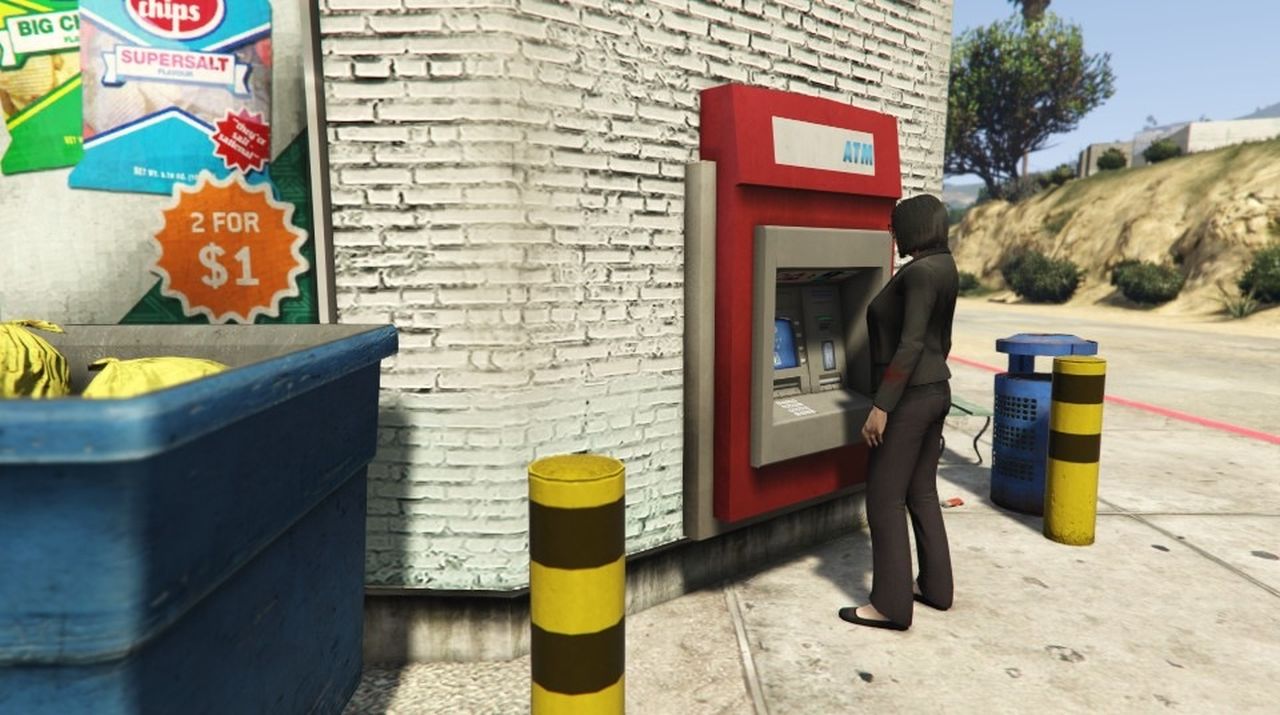Every few months we hop into GTA Online with the intention of checking out some Hot New Content. Last time, we ended up running each other over with go-karts while the party leader tried to set up a mandatory LLC and email a tax return to Rockstar. We never did reach the High Octane Bank Heist.
We have more luck this time, finally brute-forcing our way through GTA Online’s labyrinth of unintuitive menus and interfaces to reach an underwhelming turret section. Enemy vehicles line up neatly behind us and await destruction as we drive from point A to point B, both points being warehouses surrounded by goons. We give up after running out of lives - the sort of fail state that I didn’t think existed anymore in modern videogames - and spend the rest of the night driving along the west coast, looking for an ATM. We finally find one in a sleepy little coastal town that the game’s single player campaign never touches. I deposit my precious earnings while my friend drives off a cliff. We log off after riding jet skis in a storm and chatting about social anxiety.
There seems to be an impossibly wide gulf between the complexity and nuance of the virtual worlds big-budget studios are building right now and the stories and missions that populate them. GTAV’s Los Santos is a staggering environmental achievement, an unfathomable intermingling of systems and algorithms that seamlessly generates a city and a countryside with a level of detail and aesthetic purpose that makes games from just 20 years ago look like cave paintings. It displays a stunning marriage of technology and art, a perfectly realised space where the talent and personality of those who cobbled it together in a gargantuan act of collaboration and coordination is evident in every square metre. These are people you can tell have hobbies. Actual interests. These people take photographs. They probably go to museums - for fun. I bet they have a favourite cheese.
The script of GTAV is embarrassingly inept New Hollywood pastiche, a Scorsese’s Greatest Hits written by someone who doesn’t read. The only hobby this person has is regularly double-checking the street date for the 4K release of Heat (May 9th). The missions they’ve managed to conjure involve driving between cutscene triggers and shooting 1000 men from behind cover. It’s the stuff that videogames have been doing for such a very, very long time. It all seems like a staggering waste of such an immense space, such a beautiful playground rife with possibilities for play and interaction. For the most part, videogame stories model themselves after the rigidity and linearity of film. This feels increasingly restrictive as these spaces evolve - an archaic convenience tacked onto a specifically 21st century medium.
As Grand Theft Auto VI inevitably approaches, it’s tempting to imagine the possibility of it as a big quantum leap in story and mission design, just as previous entries have in the depth and breadth of their cities. At this point, releasing a bigger map that’s reduced to a delivery system for just another low-rent Goodfellas retread would seem like a colossal waste. The unsustainability of this level of development has been apparent for a while now; the next big collapse is on its way. There’s no reason to play it safe anymore, not when the wheels are already coming off.
“Does X even need a story mode anymore?” can be a reductive argument, but with a series like Grand Theft Auto it seems a fair thing to discuss. GTA Online is somehow earning Rockstar $1,730 with each passing minute. It’s nearly a decade old and it’s still being re-released on what feels like an annual basis (including again today, for nextgen consoles). None of those players are coming for stories about depressed mafiosos or to drive the drugs van to the big shootout. They’re coming to hang out with distant friends, to chat about their IBS while they crash helicopters into each other. GTA Online at it’s best is an avant-garde masterpiece, a mess of explosions and physics as dozens of people explore the myriad ways to interact with the simulation.
How do you reflect this in a conventional script? Maybe you don’t. Maybe it’s time for auteurs to get out of the way, to let the simulation speak for itself. You can’t enforce a conventional story onto such a disparate framework. Leave sweeping tales about the inner lives of criminals to prestige dramas; videogames provide so much more opportunity.
If Grand Theft Auto is fundamentally about the joy of chaos, then what better way to fulfil the vision than dropping the prestige drama pretence altogether and embracing the game’s nature as a wish-fulfilment simulation? Rockstar have already done the hard part. They’ve nailed the hard part. They’ve built the world’s most detailed sandbox, a meticulously designed and realised environment that allows for some of the most surreal interpersonal interactions available to our species. The game doesn’t need a story about depressed middle-aged men getting sucked back into a life of crime because we’re the depressed middle-aged men, and the life of crime involves wanting to drive a freight train into your friend’s virtual ragdoll as he tells you about his day. The greatest writer in the world couldn’t reach those absurdist heights.
I really hope that post-Houser Rockstar have figured out what comes next, what they’re capable of - unshackled from cinematic trappings. They have a golden opportunity to make something transcendent and self-aware, a project where their storytelling is every bit as revolutionary as their world design. It can’t just be a bigger map.

